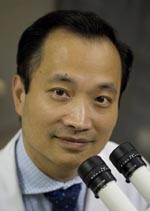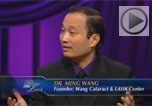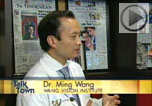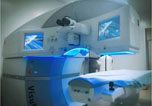- Over 55,000 LASIK and cataract procedures (including on over 4,000 doctors)
- The FIRST center in TN to offer Laser Cataract Surgery
- Introduced bladeless all-laser LASIK to the state
- Implanted the state's first FOREVER YOUNG™ Lens
- The first surgeons in the US to perform a new Intacs surgery to treat keratoconus
- Helped patients from 40 states and 55 countries
- International referral center for cataract surgery and LASIK complications
- Read Dr. Wang's book: LASIK Vision Correction
Why did you decide to have LASIK? Why did you choose Dr. Wang? How has your life changed since your LASIK procedure?
What is your advice for people considering LASIK?
Click to read more
| Home | Print This Page |
Nutrition and Eye Health
A well balanced diet with antioxidant sources may help promote eye health
By Ming Wang MD, PhD. Wang Vision 3D Cataract & LASIK Center, Nashville, Tennessee
Though nutrition is an important aspect of general health and wellbeing and good nutrition can also help with eye health, many people are under the mistaken impression that eating healthy, particularly carrots, will help them to see better. Unfortunately, if glasses or contact lenses are needed for vision correction, extra vitamins in the diet cannot take away or reduce the need for vision correction. For those looking for freedom from glasses or contact lenses, corrective surgery can be considered. Vitamin supplementation also cannot improve acuity, or how small you can read down the eye chart with vision correction. However, good nutrition does in fact promote good eye health over a lifetime and may reduce the risk of vision threatening diseases.
Vitamins A, C, and E are vitamins that provide antioxidant nutrients. Antioxidants fight oxidative stress in the body and may help to delay the formation of cataracts, macular degeneration, and other eye conditions. A well balanced diet with fruit and vegetables will contain these vitamins. In particular leafy green vegetables such as kale, spinach, and aruga and colorful fruits such as blueberries, raspberries, cherries, and cranberries are excellent sources of these vitamins. Lutein and zeaxanthin are other micronutrients which provide antioxidant effects. Because they are expressed in the macula, the area responsible for your vision when you look straight ahead, they may help reduce the risk of macular degeneration. Spinach, swiss chard, kale, parsley, pistachios, green peas, and egg yolks are excellent sources of Lutein and zeaxanthin.
Omega 3 nutrients have proven benefits for those who suffer from dry eye. They appear to work by promoting better production of the oily part of the tear film, which prevents its evaporation. Good omega 3 sources include salmon, walnuts, and flax seed. For those that cannot get enough in their diet, supplements are also a good option, but the natural sources may provide superior benefits.
For some patients with macular degeneration, supplementation is important in addition to a healthy diet. Large scale studies conducted by the National Eye Institute do indicate that patients with intermediate stage macular degeneration benefit from a particular set of nutrients called the AREDS 2 Formula. This is a high dose of vitamin C, vitamin E, Zinc, Copper, Lutein, and Zeaxanthin which has been clinically shown to reduce the rate of progression to more advanced stages of macular degeneration.
Dr. Ming Wang, a Harvard & MIT graduate (MD, magna cum laude), is the Director of Wang Vision 3D Cataract & LASIK Center. He is one of the few laser eye surgeons in the world today who holds a doctorate degree in laser physics. Dr. Wang has published 9 textbooks, holds several U.S. patents and performed the world’s first laser artificial cornea implantation. He has received many honors including the Honor Award from the American Academy of Ophthalmology, the Lifetime Achievement Award from the Association of Chinese American Physicians, and Kiwanis Nashvillian of the Year Award for this lifetime dedication to help blind orphan children worldwide. Dr. Wang has founded a 501c(3) non-profit charity that provides sight restoration surgeries free of charge for indigent patients who otherwise would never be able to afford them. Dr. Wang can be reached at: 1801 West End Ave, Ste 1150, Nashville, TN, 37203, 615- 321-8881, drwang@wangvisioninstitute. com, www.wangcataractLASIK.com. This column is produced by its sponsor Wang Vision Institute.
Our new texbooks
A 501c(3) charity that has helped patients from over 40 states in the US and 55 countries, with all sight restoration surgeries performed free-of-charge.




















